
Day 1, August 22, 2023
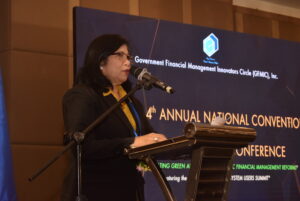 The Chairperson of the GFMIC 14th Annual National Convention and 2023 Membership Conference, Ms. Luzvi Pangan Chatto, declared the convention open at 9:30 am.
The Chairperson of the GFMIC 14th Annual National Convention and 2023 Membership Conference, Ms. Luzvi Pangan Chatto, declared the convention open at 9:30 am.
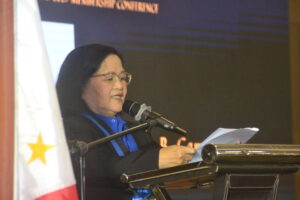 The GFMIC President, Ms. Cecilia B. Camon, gave her opening remarks and delivered the President’s Report. She highlighted that despite the ongoing pandemic, the GFMIC continued to reach out to its members offering them continuing professional development and updates with our webinars and starting this year, our face-to-face seminars. She reported that “the Board of Trustees, the members and participants that GFMIC has significantly accomplished its planned program and activities during the year from January 2023 to August 20, 2023 for a period of barely 7 months and 20 days. Still we have more than four months to accomplish more and complete the planned activities of GFMIC”. “Through the years”, she continued, “GFMIC, has distinguished itself as an effective arm in pursuing the objectives of financial management reforms and live up to what the Securities and Exchange Commission referred to us as “Organization Development Champion”.
The GFMIC President, Ms. Cecilia B. Camon, gave her opening remarks and delivered the President’s Report. She highlighted that despite the ongoing pandemic, the GFMIC continued to reach out to its members offering them continuing professional development and updates with our webinars and starting this year, our face-to-face seminars. She reported that “the Board of Trustees, the members and participants that GFMIC has significantly accomplished its planned program and activities during the year from January 2023 to August 20, 2023 for a period of barely 7 months and 20 days. Still we have more than four months to accomplish more and complete the planned activities of GFMIC”. “Through the years”, she continued, “GFMIC, has distinguished itself as an effective arm in pursuing the objectives of financial management reforms and live up to what the Securities and Exchange Commission referred to us as “Organization Development Champion”.
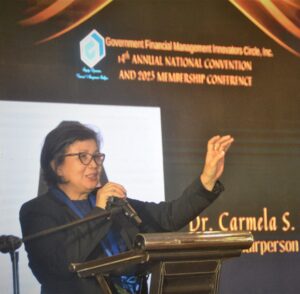 The GFMIC Chairperson, Dr. Carmela S. Perez, then welcomed us all to this year’s Annual National Convention and Membership Conference with the theme: “Advocating Green and Sustainable Public Financial Management Reforms”. She said, “By advocating green and sustainable financial management, we recognize the importance of aligning financial decisions with environmental and social values. By integrating sustainability into financial practices, economic institutions, companies, investors and government agencies and the people can contribute to a more sustainable and resilient economy while still achieving their financial objectives. This organization is mindful of this advocacy as we integrate this in our programs, projects and activities… As an outcome of the convention, we hope to generate resolutions which we will address to the agencies and officials concerned for consideration and action”.
The GFMIC Chairperson, Dr. Carmela S. Perez, then welcomed us all to this year’s Annual National Convention and Membership Conference with the theme: “Advocating Green and Sustainable Public Financial Management Reforms”. She said, “By advocating green and sustainable financial management, we recognize the importance of aligning financial decisions with environmental and social values. By integrating sustainability into financial practices, economic institutions, companies, investors and government agencies and the people can contribute to a more sustainable and resilient economy while still achieving their financial objectives. This organization is mindful of this advocacy as we integrate this in our programs, projects and activities… As an outcome of the convention, we hope to generate resolutions which we will address to the agencies and officials concerned for consideration and action”.
Come to think of it, we are the only organization I know which has highlighted the importance of advocating “green” in the mainstream of public financial management.
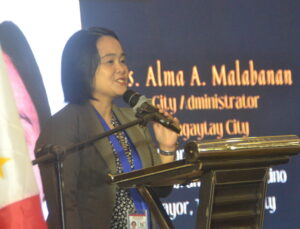 Chairperson Perez then introduced our host, City Mayor Abraham Tolentino who unfortunately couldn’t make it personally but was ably represented by the City Administrator, Ms. Alma Malabanan. Ms. Malabanan then turned over the symbolic key of the City of Tagaytay, which Chairperson Perez and President Camon accepted on behalf of the GFMIC family and this convention and membership conference. What’s more, we were witnesses to the City’s hospitality, as we were treated to a spectacular dance number by the city’s science high school students.
Chairperson Perez then introduced our host, City Mayor Abraham Tolentino who unfortunately couldn’t make it personally but was ably represented by the City Administrator, Ms. Alma Malabanan. Ms. Malabanan then turned over the symbolic key of the City of Tagaytay, which Chairperson Perez and President Camon accepted on behalf of the GFMIC family and this convention and membership conference. What’s more, we were witnesses to the City’s hospitality, as we were treated to a spectacular dance number by the city’s science high school students.
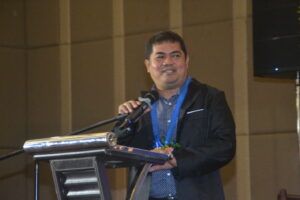 Our GFMIC Deputy Treasurer, Atty. Richard Fulleros, then proceeded to announce the rules for the annual election of the seats of the GFMIC Board of Trustees that will be vacated this year. The actual election will happen on the third day of this joint convention and membership conference. All those who are eligible and willing are encouraged to signify their intention to join the GFMIC Board of Trustees.
Our GFMIC Deputy Treasurer, Atty. Richard Fulleros, then proceeded to announce the rules for the annual election of the seats of the GFMIC Board of Trustees that will be vacated this year. The actual election will happen on the third day of this joint convention and membership conference. All those who are eligible and willing are encouraged to signify their intention to join the GFMIC Board of Trustees.
 We then proceeded to the highlight of the day with the presentation of the first technical session of the convention on Green Budgeting. Our resource speaker, Dr. Jojit Basilio of the Department of Budget and Management (DBM) gave us a comprehensive lecture on the efforts of the national government in incorporating climate-related and risk-mitigation issues in the budgeting process and how each of us should consciously incorporate climate change expenditure tagging (CCET) in all programs or projects whose main objective or one of its objectives explicitly articulates climate change adaptation or mitigation. Dr. Basilio assured us that “The implementation of the climate budgeting system over the years has begun to transform climate policy and programming decisions at the NGA, inter-agency, LGU, and national oversight agency levels.”
We then proceeded to the highlight of the day with the presentation of the first technical session of the convention on Green Budgeting. Our resource speaker, Dr. Jojit Basilio of the Department of Budget and Management (DBM) gave us a comprehensive lecture on the efforts of the national government in incorporating climate-related and risk-mitigation issues in the budgeting process and how each of us should consciously incorporate climate change expenditure tagging (CCET) in all programs or projects whose main objective or one of its objectives explicitly articulates climate change adaptation or mitigation. Dr. Basilio assured us that “The implementation of the climate budgeting system over the years has begun to transform climate policy and programming decisions at the NGA, inter-agency, LGU, and national oversight agency levels.”
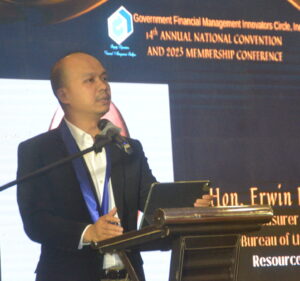 This was followed by an equally interesting second technical session conducted by the Deputy Treasurer of the Philippines (DTOP), Atty. Erwin Sta. Ana, who talked about the government’s sustainable finance framework. A fairly new concept that he introduced to us is borrowing for and funding “ESG” which stands for Environment (which relates to quality and functioning of the natural environment/systems; examples of which are Climate Change, Environmental Management, Biodiversity, Water efficiency, carbon management), Social (which relates to rights,
This was followed by an equally interesting second technical session conducted by the Deputy Treasurer of the Philippines (DTOP), Atty. Erwin Sta. Ana, who talked about the government’s sustainable finance framework. A fairly new concept that he introduced to us is borrowing for and funding “ESG” which stands for Environment (which relates to quality and functioning of the natural environment/systems; examples of which are Climate Change, Environmental Management, Biodiversity, Water efficiency, carbon management), Social (which relates to rights,
well-being and interests of people and communities; examples of which are Employment, Education, Health and Safety), and Governance (which relates to the management of investee entities such as Ethics, Compliance, Compensation, Corruption and Bribery, Diversity).
What is comforting to note is that we are far from the proverbial “the right hand does not know what the left hand is doing”. Our efforts to incorporate the green in budgeting by DBM is further strengthened by the solid and sustainable finance framework carried out by our Bureau of the Treasury. DTOP Erwin assured us that we shall be able to pay our national debts … in due time.
The day was capped with the keynote speech of no other than our DBM Sec. Amenah Pangandaman. She echoed what PBBM articulated in his latest SONA. “We can never lose sight of our responsibility to the future. The economic agenda cannot and will not ever be incompatible with our climate change agenda.”
She then proceeded to state that “Throughout the budget process, we have been tagging our climate change expenditures, enabling policy makers to better understand the scope and distribution of our climate action. It also provides much-needed evidence of our institutional readiness for scaling up climate finance in the country. This has increased the awareness of national government agencies and local government units to craft climate-and-disaster-responsive budgets. More importantly, climate actions have been mainstreamed and institutionalized in our development plan and the National Budget.”
Day 2, August 23, 2023
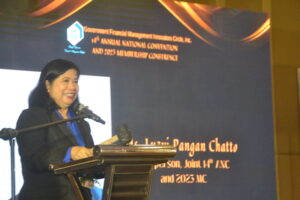 The Chairperson of the GFMIC Joint 14th Annual National Convention and 2023 Membership Conference, Ms. Luzvi Pangan Chatto, started off with the introduction of the day’s keynote speaker, the Hon. Mario G. Lipana, COA Commissioner, who unfortunately was called to a meeting of the COA Commission Proper and could not make it to our convention. Chairperson Chatto then proceeded to introduce COA Assistant Commissioner Alexander B. Juliano, who then delivered Commissioner Lipana’s keynote speech on his behalf.
The Chairperson of the GFMIC Joint 14th Annual National Convention and 2023 Membership Conference, Ms. Luzvi Pangan Chatto, started off with the introduction of the day’s keynote speaker, the Hon. Mario G. Lipana, COA Commissioner, who unfortunately was called to a meeting of the COA Commission Proper and could not make it to our convention. Chairperson Chatto then proceeded to introduce COA Assistant Commissioner Alexander B. Juliano, who then delivered Commissioner Lipana’s keynote speech on his behalf.
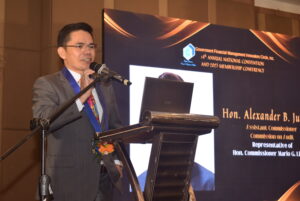 In his keynote address, Commissioner Lipana not only thanked GFMIC for the opportunity for him to share with us the broad strokes or successes, the challenges and planned next steps on the implementation of eNGAS and eBudget System to continuously improve governance for the benefit of every Filipino, he even praised our organization by stating “Since its creation, GFMIC has grown to be a solid, dynamic and esteemed association worth emulating, as it has evolved from a circle of eNGAS users and enthusiasts to an association of public financial management professionals who utilize information and communications technology as a tool for productivity, transparency and accountability.” He then proceeded to describe in great detail the features of the two systems, the challenges COA faced in supporting and improving the software, and the immediate plans in the next few years on its development rollout and support. He closed with these words of exhortation, quoting Henry Ford:
He said: “Coming together is a beginning. Keeping together is progress. Working together is success.”
In his keynote address, Commissioner Lipana not only thanked GFMIC for the opportunity for him to share with us the broad strokes or successes, the challenges and planned next steps on the implementation of eNGAS and eBudget System to continuously improve governance for the benefit of every Filipino, he even praised our organization by stating “Since its creation, GFMIC has grown to be a solid, dynamic and esteemed association worth emulating, as it has evolved from a circle of eNGAS users and enthusiasts to an association of public financial management professionals who utilize information and communications technology as a tool for productivity, transparency and accountability.” He then proceeded to describe in great detail the features of the two systems, the challenges COA faced in supporting and improving the software, and the immediate plans in the next few years on its development rollout and support. He closed with these words of exhortation, quoting Henry Ford:
He said: “Coming together is a beginning. Keeping together is progress. Working together is success.”
We then witnessed the highlight of yesterday’s event: the awarding of the outstanding eNGAS and eBudget System Users.
The Chairperson of the awards committee, Ms. Luzvi Pangan Chatto, discussed the award categories and the criteria for each of these awards and the mechanics of self-nomination, validation of self-nominations, and selection of awardees. In summary, these year’s awards total 40 in all, garnered by 37 awardees, the largest number GFMIC has ever given since its inception.
Congratulations to all the awardees!
| Award Category | Awardee-Agency |
| eNGAS and eBudget System Inclusiveness Award (formerly Gallantry Award) | National Government
Agencies (NGAs)
|
| eNGAS System Inclusiveness Award (formerly Gallantry Award) | NGAs
|
| eNGAS and eBudget System Collaborator/ Contributor Award | Local Government Unit (LGU)
|
| eNGAS Collaborator/ Contributor Award | NGAs
|
| eNGAS and eBudget System Grassroot Implementer Award | LGUs
|
| eNGAS Grassroot Implementer Award | LGUs
|
| Outstanding eNGAS and eBudget System User Entity Award | NGA
|
| Outstanding eNGAS User Entity Award | NGAs
|
| Outstanding eNGAS and eBudget System User Audit Team Award | Audit Teams
|
| Outstanding eNGAS System User Audit Team Award | Audit Teams
|
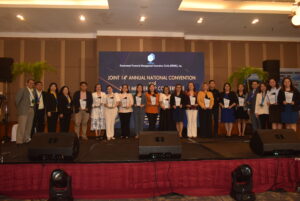
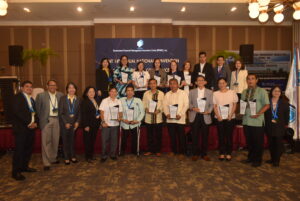
The awards committee Chairperson Chatto announced that there still is one category in the awards lineup, the Hall-of-Fame Award, but there were no awardees for this year. She then encouraged all eNGAS and eBudget System users to aim for the Hall-of-Fame Award and hope that there would be more candidates aspiring to be awardees next year.
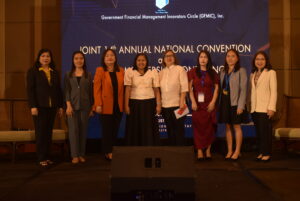 The afternoon was full of exciting stories and testimonials of a representative group of these awardees on how they faced their eNGAS and eBudget System implementation journeys, their joys and pains, their gains and challenges. Foremost in their list of challenges are the daunting number of operating units they have to transform from a purely manual system to a fully automated one; their resistance to change to leave their comfort zones; data migration and transaction complexity; and at times, the lack of support from their highest-ranking officials. This is why our GFMIC Chairperson Perez was so excited and pleased to note that no less than the mayor and vice mayor of Aguinaldo, Ifugao and the mayor of the municipality of Mayoyao, Ifugao were actually physically present to receive their awards!
The afternoon was full of exciting stories and testimonials of a representative group of these awardees on how they faced their eNGAS and eBudget System implementation journeys, their joys and pains, their gains and challenges. Foremost in their list of challenges are the daunting number of operating units they have to transform from a purely manual system to a fully automated one; their resistance to change to leave their comfort zones; data migration and transaction complexity; and at times, the lack of support from their highest-ranking officials. This is why our GFMIC Chairperson Perez was so excited and pleased to note that no less than the mayor and vice mayor of Aguinaldo, Ifugao and the mayor of the municipality of Mayoyao, Ifugao were actually physically present to receive their awards!
Most of those who gave their testimonials even candidly suggested improvements to be incorporated into the systems such as:
· Improve data handling to handle voluminous data without lagging and errors.
· Improved User Help Desk/Ticket submission feature for reporting system errors.
· Shift to cloud-based database for anytime/anywhere access.
· Include generation of restated comparative financial statements if possible.
· System updates to correct errors in generating schedules.
· Integration with other agency information systems.
· Address errors in the computation of depreciation.
…just to name a few.
This led our Awards Committee Chairperson to suggest that we take stock of all these comments and suggestions and resolve to bring all these up to the attention of the Commission on Audit for them to acknowledge and commit to consider these in the future updating, upgrading, and improvement of the eNGAS and eBudget System.
This interactive exchange of ideas and the passion we all felt from presentations of these awardees led the GFMIC Board of Trustees to decide there and then, to induct all these awardees who were present as new members of the Government Financial Management Innovators Circle, Inc.
Of course, the Filipinos that we are, no event will ever be complete without our pictures taken.
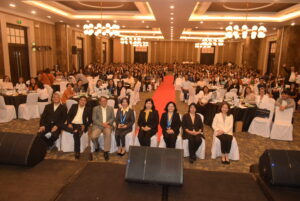
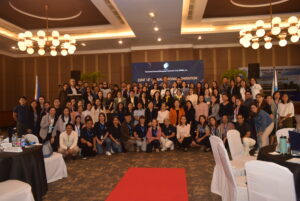
Day 3, August 24, 2023
The day started with a short briefing on the mechanics to be followed for the election of the new members of the Board of Trustees to fill up the seven positions that are vacant as of yesterday: five vacancies due to the completion of the terms of the incumbent trustees and two unfilled vacancies from last year’s election. Assistant Treasurer Atty. Richard Fulleros outlined the procedure to be followed and announced that elections shall commence as soon as the final roster of candidates will be posted by 10:00 a.m. Elections shall close by 3:00 p.m. and the winning candidates shall be announced by 3:15 p.m.
We then proceeded with Technical Session 4 on the Philippine Government’s Journey towards the Implementation of the United Nations Sustainable Development Goals delivered by Undersecretary Rosemarie G. Edillon, who was introduced by GFMIC President Cecilia B. Camon. The core of her message is that:
1. It there’s anything good the pandemic has taught us, it is that governance is more important than government.
2. Now that the country is recovering, we are being taught the same lesson: governance is still more important than government.
3. To govern, government needs to INSPIRE, EMPOWER, and LEAD by example.
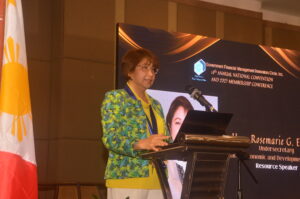 She delved into the details of the 17 sustainable development goals and how the government organization was structured to ensure that these goals are carried out, monitored, and delivered before 2030 – barely seven years more to go. To ensure transparency and accountability, the status and progress of these goals are embodied in the Philippine Development Plan and is published in the NEDA website for all citizens to see and appreciate.
She delved into the details of the 17 sustainable development goals and how the government organization was structured to ensure that these goals are carried out, monitored, and delivered before 2030 – barely seven years more to go. To ensure transparency and accountability, the status and progress of these goals are embodied in the Philippine Development Plan and is published in the NEDA website for all citizens to see and appreciate.
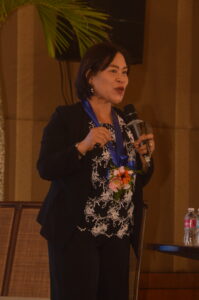 Technical Session 5 which immediately followed provided a stark contrast to the serious topic that preceded it. Dr. Leah S. Corpuz, a teacher by heart, Founder and Lead Trainer of the LASC Learning Solutions, taught us all how to Power Up! And be Happy at Home = Happy at Work! Essentially, she taught us all how to acquire the discipline to manage our thoughts, emotions, and actions (TEA) giving us colorful examples of how to apply her guiding principles such as applying the 1% rule in developing habits or learning how to pause and manage knee-jerk reactions, or striving to always remember to have the same discipline as the day we were hired, that made the delegates roll on the floor with laughter.
Technical Session 5 which immediately followed provided a stark contrast to the serious topic that preceded it. Dr. Leah S. Corpuz, a teacher by heart, Founder and Lead Trainer of the LASC Learning Solutions, taught us all how to Power Up! And be Happy at Home = Happy at Work! Essentially, she taught us all how to acquire the discipline to manage our thoughts, emotions, and actions (TEA) giving us colorful examples of how to apply her guiding principles such as applying the 1% rule in developing habits or learning how to pause and manage knee-jerk reactions, or striving to always remember to have the same discipline as the day we were hired, that made the delegates roll on the floor with laughter.
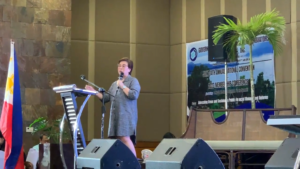 In the next technical session, Director Aida C. Yuvienco of the Department of Information and Communications Technology (DICT) discussed Greening the Philippine ICT. She pointed out that our thrust for digitalization and digital transformation is not without its toll on our environment. The digital sector’s proportion on global emission is between 3% to 4% annually and is increasing by 9% annually. The Google data center alone consumes approximately 450,000 gallons of water daily! Green computing therefore seeks to reduce the use of hazardous materials, maximize energy efficiency during the IT systems’ lifetime, and increasing the recyclability or biodegradability of defunct ICT products and factory waste. Green computing must be applied to all classes of systems, ranging from handheld systems to large-scale data centers. She concluded with an assurance that our DICT shall embrace green digital governance and will issue environmentally sustainable policies and practices to guide the government in adopting green computing initiatives.
In the next technical session, Director Aida C. Yuvienco of the Department of Information and Communications Technology (DICT) discussed Greening the Philippine ICT. She pointed out that our thrust for digitalization and digital transformation is not without its toll on our environment. The digital sector’s proportion on global emission is between 3% to 4% annually and is increasing by 9% annually. The Google data center alone consumes approximately 450,000 gallons of water daily! Green computing therefore seeks to reduce the use of hazardous materials, maximize energy efficiency during the IT systems’ lifetime, and increasing the recyclability or biodegradability of defunct ICT products and factory waste. Green computing must be applied to all classes of systems, ranging from handheld systems to large-scale data centers. She concluded with an assurance that our DICT shall embrace green digital governance and will issue environmentally sustainable policies and practices to guide the government in adopting green computing initiatives.
Then came the highlight of the day: the announcement of the results of the election! Atty. Richard Fulleros announced that of the eight candidates, the top seven of which will sit on the board of trustees, the difference between the 7th and 8th candidates is just ONE vote! The seven elected Board of Trustees members are as follows:
1. Ms. Cecilia B. Camon
2. Ms. Ma. Lourdes V. Dedal
3. Mr. Johannes M. Camasura
4. Ms. Marietta M. Lorenzo
5. Ms. Imelda B. Galinato
6. Mr. Renato A. Santos
7. Atty. Juanita C. Fuggan
Seeing how close the 8th candidate is, the GFMIC Board decided to appoint Ms. Anna Rutchel Olegario as Chair of the GFMIC Membership Committee with Mr. Johannes M. Camasura as a Member.
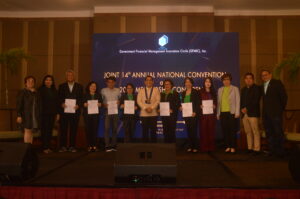 Commissioner Roland C. Pondoc then proceeded to preside in the induction ceremony of the newly-elected Board members after which he delivered a very touching admonition not only for all the newly-elected members but for all of us public servants, to personify Integrity and Public Service for the benefit of the Filipino people. “As government employees”, he said, “let us make this government free from any form of corruption and go away with our self-interests for money. And in whatever we do, let us keep the right values above all. Especially those good values that we can teach through leadership by action to our children and to the youth who will succeed us and who, I still believe, are considered as the hope of our nation.” Remember that life is good when you are happy but much better when others are happy because of you!
Commissioner Roland C. Pondoc then proceeded to preside in the induction ceremony of the newly-elected Board members after which he delivered a very touching admonition not only for all the newly-elected members but for all of us public servants, to personify Integrity and Public Service for the benefit of the Filipino people. “As government employees”, he said, “let us make this government free from any form of corruption and go away with our self-interests for money. And in whatever we do, let us keep the right values above all. Especially those good values that we can teach through leadership by action to our children and to the youth who will succeed us and who, I still believe, are considered as the hope of our nation.” Remember that life is good when you are happy but much better when others are happy because of you!
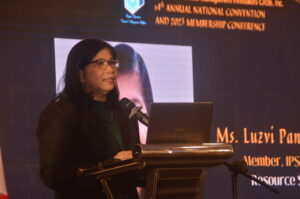 The last technical session for the convention was a very comprehensive and informative presentation on the International Public Sector Accounting Standards (IPSAS) Board’s Sustainability Reporting Project by no other than GFMIC’s Pride and Joy, Trustee Luzvi Pangan Chatto, member of the IPSAS Board, now on her second three-year term.
The last technical session for the convention was a very comprehensive and informative presentation on the International Public Sector Accounting Standards (IPSAS) Board’s Sustainability Reporting Project by no other than GFMIC’s Pride and Joy, Trustee Luzvi Pangan Chatto, member of the IPSAS Board, now on her second three-year term.
After a brief description of what the IPSAS Board is, its functions, and mechanisms, IPSAS Board Member Ms. Chatto gave us an update on the status of the Consultation Paper the IPSAS Board is working on Advancing Public Sector Sustainability Reporting.
o Aimed at evaluating:
•stakeholders’ demand for sustainability reporting guidance
•the degree of support for the IPSASB’s involvement in the process
•the priority areas for guidance, and how this might be approached.
o Proposals that the IPSASB:
•Serve as the standard setter for global public sector specific sustainability guidance, drawing upon its experience, processes, and global relationships.
•Develop initial guidance focused on general disclosure requirements for sustainability-related information and climate-related disclosures.
•Approach guidance development at an accelerated pace, with a potential for releasing initial guidance by the end of 2023.
What is good to note that the IPSAS Board itself is also currently looking at a Climate-Related Disclosure Project, aimed at completion in 2025, to develop a global baseline for consistent and comparable public sector climate-related (and therefore green) disclosures, separate from their current suite of IPSAS to meet the needs of users of public sector sustainability reports and ensure better transparency, accountability and enable improved decision making.
Day 4, August 25, 2023
The last day of the convention started with the introduction by Chairperson Perez of the keynote speaker, Ms. Laura Robinson, President of The International Consortium on Governmental Financial Management (ICGFM). In her keynote address, Ms. Laura Robinson highlighted the themes of change, transformation, and resilience. She commended the award winners and expressed her pleasure in attending again a GFMIC conference. Ms. Robinson emphasized that change is an external phenomenon, while transformation involves adapting oneself to changing circumstances. Resilience, she noted, is the capacity to respond quickly to temporary disruptions and to efficiently transform in the face of permanent changes.
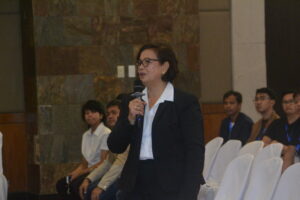 Drawing parallels from personal experiences, she discussed how resilience is cultivated through information, assets, and skills acquired before disruptions occur. This concept extends to individuals, small groups, large organizations, ministries, governments, and global institutions. Ms. Robinson highlighted that resilience is nurtured internally and through relationships, making events like the GFMIC Annual National Convention and Membership Conference crucial for acquiring new information, developing skills, and understanding how to utilize assets effectively.
Drawing parallels from personal experiences, she discussed how resilience is cultivated through information, assets, and skills acquired before disruptions occur. This concept extends to individuals, small groups, large organizations, ministries, governments, and global institutions. Ms. Robinson highlighted that resilience is nurtured internally and through relationships, making events like the GFMIC Annual National Convention and Membership Conference crucial for acquiring new information, developing skills, and understanding how to utilize assets effectively.
The topics of the event, including Green Public Financial Management (PFM), technology, and IPSAS (International Public Sector Accounting Standards) implementation, were underscored as pivotal for building resilience in careers and institutions. Ms. Robinson shared her role as President of ICGFM, which advocates best practices in PFM globally through collaboration between public and private sectors, development banks, and academia.
She detailed how ICGFM navigated the challenges brought about by the COVID-19 pandemic, transforming from in-person events to a combination of virtual and physical activities to maximize value for its members. This transformation was guided by the mission to foster resilience within the organization and its members.
Ms. Robinson lauded the participation of the Philippines in ICGFM and highlighted that resilience extends to addressing critical issues like Green PFM, climate finance, IPSAS transition, and the integration of information technology and Artificial Intelligence (AI) in PFM. She emphasized that the impacts of climate change demand resilience in individuals, systems, and institutions.
She discussed the importance of transitioning to IPSAS accrual standards, acknowledging the challenges and risks involved in such transformation but highlighting its necessity in a rapidly changing world driven by new technology and increased interaction.
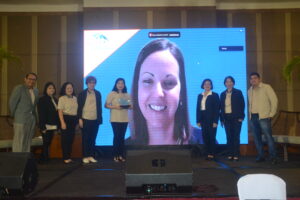 In conclusion, Ms. Robinson expressed gratitude for the relationship between ICGFM and GFMIC, emphasizing the need for transformation, the acquisition of information and skills, and the cultivation of relationships to adapt to the ever-changing landscape.
In conclusion, Ms. Robinson expressed gratitude for the relationship between ICGFM and GFMIC, emphasizing the need for transformation, the acquisition of information and skills, and the cultivation of relationships to adapt to the ever-changing landscape.
After the keynote address, GFMIC’s VP Carlito Magsino presented the ff. resolutions which were willingly approved by GFMIC members:
Proposed Resolutions:
Resolution #1
PBBM articulated in his latest SONA, “We can never lose sight of our responsibility to the future. The economic agenda cannot and will not ever be incompatible with our climate change agenda.”
·Thus, we shall resolve to include “GREEN PFM” in the continuing professional development of our GFMIC members.
·We shall involve Department of Budget and Management and Bureau of the Treasury (BTr) in our efforts to reach out and educate PFM practitioners in future GFMIC webinars and seminars.
Resolution #2
Heeding the call of the DBM Secretary for GFMIC to actively contribute to the success of the Integrated Financial Management Information System (IFMIS);
·We shall actively involve our members, especially those who possess institutional memory at the onset of the GIFMIS in 2011;
·We shall serve as catalysts and bring together the Commission on Audit (COA), DBM, Department of Finance (DOF), BTr, and Department of Information and Communications Technology (DICT) and help establish the core and governance structure of the IFMIS Project;
·Push the crafting of the 5-year PFM Reform Roadmap as mandated in the newly issued EO 29, s. 2023.
Resolution #3
Provide COA with the list of issues and concerns with the eNGAS and eBudget Systems;
·Get the commitment of COA, specifically the Accounting Systems Development and Other Services Office (ASDOSO) of the Government Accountancy Sector (GAS) in the future updating, upgrading, support and resolution of these issues and concerns;
·Follow up the request (with DBM) for the beefing up of the organizational support structure of COA (ASDOSO).
Resolution #4
To prod DICT to craft a government-wide enterprise architecture and development strategy for whole-of-government integration of application systems;
·Enable various agencies of government to simultaneously develop and enhance their agency specific systems, e.g. Human Resource Information System, Payroll System, Health and Hospital Systems, and yet be ready for systems integration with the IFMIS in the near future.
Resolution #5
For DBM to revive the policy review of the mechanics for the disposal of computer equipment that has reached its end-of-economic-life;
·Look at the possibility of incumbent users acquiring such computing equipment and gadgets that has been fully depreciated.
Resolution #6
On supporting the national sustainable development goals (SDG), to consider the parameters of the SDG commitments in the annual crafting of the mechanics of the performance-based bonus (PBB) to ensure alignment of the efforts of national government agencies, local government units, and government corporations with the areas that need focus and catching up;
·NEDA to take the lead as part of the AO25 Technical Working Group
Resolution #7
To prod DICT to embrace green digital governance and issue environmentally sustainable policies and practices to guide government in adopting green computing initiatives.
·To reconvene the Government-Wide Medium-Term Information and Communications Technology Harmonization Initiative (MITHI) and assure coordination and consistency among NEDA’s green development goals and DBM’s green budgeting processes.
Way Forward on GFMIC Membership
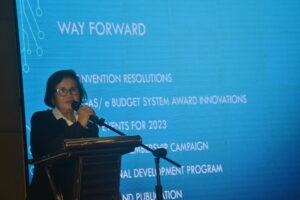 GFMIC Chairperson Carmela Perez also reiterated during the discussion on Way Forward on GFMIC Membership the importance of gathering together. She further gave emphasis on strengthening membership specifically in the rank and file sector. Also, she expressed her desire that the organization would be able to include more members in the Information and Communications Technology sector of the government.
GFMIC Chairperson Carmela Perez also reiterated during the discussion on Way Forward on GFMIC Membership the importance of gathering together. She further gave emphasis on strengthening membership specifically in the rank and file sector. Also, she expressed her desire that the organization would be able to include more members in the Information and Communications Technology sector of the government.
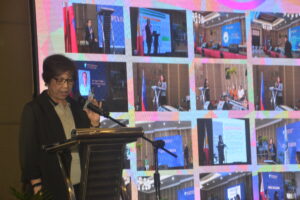 In her closing remarks, Executive Vice President (EVP) Rosicar E. Escober expressed gratitude for the enlightening journey on “Advocating Green and Sustainable Public Financial Management Reforms”. Over four days, participants discussed topics from Green Budgeting to Sustainable Development Goals. She highlighted the value of aligning finance with sustainability and reshaping public management. EVP Escober urged the attendees to carry gained insights forward, emphasizing that advocating for green financial reforms is a responsibility to the environment. She thanked speakers and participants for enriching the convention and conference and encouraged ongoing efforts to nurture the seeds of change. The journey continues, aiming for a greener future in public financial management.
In her closing remarks, Executive Vice President (EVP) Rosicar E. Escober expressed gratitude for the enlightening journey on “Advocating Green and Sustainable Public Financial Management Reforms”. Over four days, participants discussed topics from Green Budgeting to Sustainable Development Goals. She highlighted the value of aligning finance with sustainability and reshaping public management. EVP Escober urged the attendees to carry gained insights forward, emphasizing that advocating for green financial reforms is a responsibility to the environment. She thanked speakers and participants for enriching the convention and conference and encouraged ongoing efforts to nurture the seeds of change. The journey continues, aiming for a greener future in public financial management.
